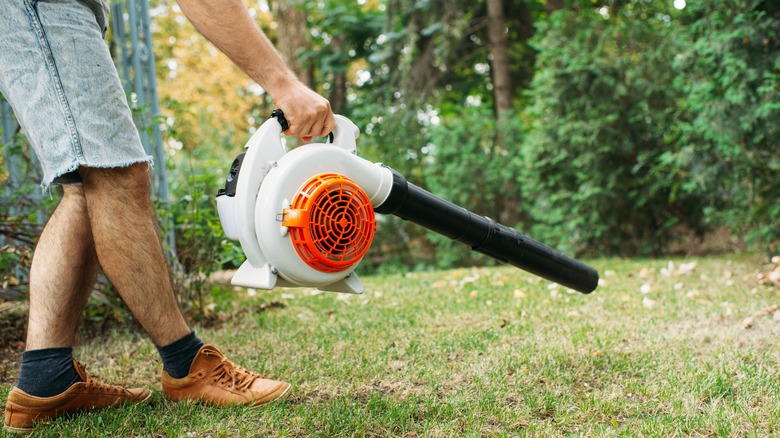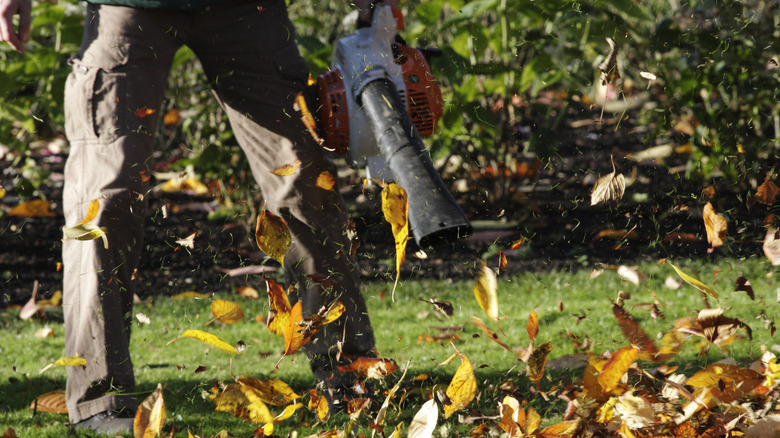Gas Vs. Electric Leaf Blower: Which One Is Right For You?
Fallen leaves left on a lawn can be damaging to your grass, and a messy yard could annoy your neighbor. Fortunately, a great way to vanquish these leafy invaders is by purchasing a leaf blower. But which weapon in this war on leaves will suit you best: gas or electric? The environment you face plays a crucial role. For expansive landscapes or territories laden with stubborn debris, a powerful machine might be necessary. These champions can produce fierce winds, efficiently clearing leaves, twigs, and even small branches.
On the other hand, if your environment is more contained, a nimble and reliable fighter might be a better choice. These machines, while not as overpowering, can still hold their own and offer unwavering support over long campaigns. They may require occasional resupply, but their freedom of movement grants them an edge in navigating tight spaces. In short, consider the size of your domain, the nature of the enemy, and the tactics that suit you best. But now that we know the crucial variables to look out for, let's look to see how gas and electric leaf blowers differ in their attributes.
Convenience and ease of use
Convenience and ease of use are significant factors when selecting a leaf blower. Electric leaf blowers excel in this regard due to their lightweight design and user-friendly operation. They are easier to maneuver and cause less fatigue during extended use. Corded electric blowers offer unlimited run time as long as they're connected to a power source, making them ideal for longer tasks without the hassle of recharging. However, their mobility is limited by the cord length, necessitating an appropriate extension cord. And of course, cordless electric blowers provide the freedom to move around without being tethered, but their operation time is limited by battery life, usually ranging from 20 to 60 minutes per charge.
Gas leaf blowers, while powerful, require more effort to start. They're heavier due to their engines and fuel tanks, which can make them more cumbersome to use for extended periods. Therefore, if ease of use and convenience are priorities, especially for smaller yards or less frequent use, an electric blower may be more suitable.
Environmental impact
Environmental impact is an important consideration for eco-conscious homeowners. Electric leaf blowers have a clear advantage in this area, producing no direct emissions and contributing less to air pollution. Corded electric models are particularly eco-friendly as they draw power from the electrical grid, and their environmental footprint depends on the energy source used for electricity generation. Cordless models are also relatively green, though their environmental impact includes battery production and disposal.
Gas leaf blowers, on the other hand, burn fossil fuels and emit pollutants, including carbon monoxide, hydrocarbons, and nitrogen oxides, which contribute to air pollution and climate change. Additionally, gas blowers generate noise pollution, which can disturb the neighborhood and wildlife. For those looking to minimize their environmental impact, electric leaf blowers — especially corded models — are the preferable choice. By choosing an electric blower, homeowners can reduce their carbon footprint, aligning with more sustainable and community-friendly practices.
Noise levels
Noise levels are a significant factor to consider when choosing between gas and electric leaf blowers. Gas leaf blowers are notoriously loud, often exceeding 100 decibels, which can be disruptive to both the user and neighbors. Prolonged exposure to such high noise levels can lead to hearing damage if you're not using proper ear protection. The loud operation can also disturb local wildlife and contribute to noise pollution in residential areas.
In contrast, electric leaf blowers are generally much quieter, with corded models producing the least noise. Cordless electric blowers are also quieter than gas models, though they may produce more noise than their corded counterparts. The reduced noise levels of electric blowers make them more suitable for use in densely populated areas or where noise restrictions are in place. They allow for more flexible usage times without disturbing the peace. If you value a quieter operation and need to comply with local ordinances, an electric leaf blower is likely the better option. Additionally, the quieter performance can make yard work more pleasant and less stressful for both the operator and surrounding neighbors.
Cost and maintenance
Cost and maintenance are practical considerations when deciding between gas and electric leaf blowers. Electric blowers generally have a lower upfront cost, especially corded models, which are the most affordable. They also have minimal ongoing maintenance costs since they do not require fuel, oil changes, or spark plug replacements. Battery-powered models may require periodic battery replacements, but this is typically less costly than maintaining a gas engine.
Gas leaf blowers, while more expensive initially, require regular maintenance to keep them running efficiently. This includes engine servicing, and parts replacement, which can add to the overall cost of ownership. However, gas blowers are often more durable and can handle more demanding tasks, which might justify the higher cost for users with extensive yard care needs. When evaluating costs, it's important to consider both the initial purchase price and the long-term maintenance expenses. For budget-conscious homeowners with smaller yards, electric blowers offer a cost-effective solution. For those with larger properties and more intensive needs, the higher cost and maintenance of a gas blower might be worth the investment.
Choosing the right blower for your needs
Ultimately, the best leaf blower for you depends on your specific needs and preferences. Gas blowers are ideal for extensive properties, commercial use, or situations where high power is essential to tackle tough yard tasks. If you prefer a quieter, more environmentally-friendly option that is easy to use and maintain, an electric leaf blower is likely the better fit.
Electric blowers are suitable for small to medium-sized yards, offering adequate performance with less noise and environmental impact. Consider the size of your yard, the typical amount of debris, your tolerance for noise, and your environmental concerns when making your decision. Evaluating these factors will help you choose the most suitable leaf blower for your needs, ensuring that you have the right tool for maintaining a clean and tidy yard while aligning with your lifestyle and values. If you've picked your leaf blower and are looking for more tips to keep your garden looking in great shape, follow these tips only professional landscapers know.





